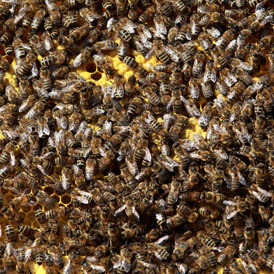Bee decline ‘not caused by pesticides’
Insecticides aren’t to blame for the decline of Britain’s bees, the Government’s top bee scientist tells Channel 4 News.

The announcement comes as a leading American bee researcher who first posed a link between insecticides called neonicotinoids and bee deaths told MPs today that his research doesn’t explain bee losses seen in the US.
Dr Helen Thompson, bee scientist at the National Bee Unit, near York, told Channel 4 News that the Government has reviewed all the data on a link between insecticides and bees, and concluded they are not the primary cause of the decline.
“There’s been a lot of studies undertaken, across Europe and here in the UK and there’s been no strong evidence they are linked to bee losses at all,” said Dr Helen Thompson at Defra’s Food and Environment Research Agency in York.
Campaign groups are calling for a suspension of neonicotinoid insecticides. The chemicals, which mimic the insecticidal properties of nicotine, are applied to crop seeds and are taken up by the growing plant.
Campaigners are concerned that even very low levels of insecticide found in nectar and pollen can poison bees and other insects. They say that the approvals process for insecticides doesn’t currently include the chronic effects of insecticides that are absorbed into plants.
“We need to know that these pesticides are completely safe in order to use them out in the UK countryside.” Vicky Kinemba, Buglife
“There is evidence from laboratory studies that they are having effects on foraging behaviour and effects on reproduction of bees and we need to know that these pesticides are completely safe in order to use them out in the UK countryside,” said Vicky Kinemba of insect conservation group Buglife.
It’s an important issue as bees don’t just make honey. Around 80 per cent of crops and wild flowers are pollinated by bees. The economic value of crops they and wild insects pollinate is around a billion pounds a year. Without them, farmers would be in trouble.
But the case against insecticides may have just got weaker still. Concerns first emerged in the US where beekeepers have seen mass die-offs in their hives.
Today, however the leading American researcher who linked the insecticides to outbreaks of bee diseases told Channel 4 News that what he saw in the lab doesn’t occur in working hives.
“The lab study certainly seemed very clear that low levels of pesticides were impacting on honey bee health. But when we look in the field we don’t see the same results. Even when colonies that were exposed to low levels we’re not seeing outbreaks of the gut parasite pathogen that we saw in the lab,” said Dr Jeff Pettis of the US Agricultural Research Service.
Is there really a decline?
What’s more, Government bee scientists dispute the fact British bees are declining like they are in the US.
When bees die in mysterious circumstances, inspectors send their remains to the National Bee Unit in York.
Diseases can mean 10 -15 per cent of hives die over winter – in bad years it can be higher. But the latest evidence suggests there have been no major changes to the health of British honeybees.
“People have assumed that the bee losses that have been occurring in the US, are also happening here. But it’s not happening here at the moment,” said Thompson. “We’re not saying it can’t happen and we’re monitoring that through the National Bee Unit we have 40,000 colony inspections a year.”
Honeybees may be coping, but scientists agree there is problem among wild pollinators, like bumblebees and hoverflies and moths. Some studies indicate they may be as important for pollination as honeybees.
While crops, like oilseed rape, provide nectar in spring, year-round food from wild flowers is increasingly scarce.
Most researchers agree with groups like Buglife that only focusing research funds on honey bees could mean the needs of wild insects are being overlooked. Dwindling food resources will affect wild pollinators and honey bees alike.
“Even a healthy honeybee has to eat,” says Prof Francis Ratnieks, bee researcher at the University of Sussex. “And what happened to all our flowers?”